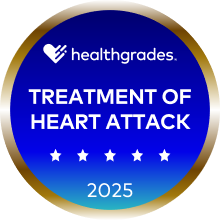Preparing for Heart Surgery
Knowing how to prepare for your heart surgery will help you feel more comfortable about the procedure.
The information covers before your surgery, the day of your surgery, and your recovery process.
Please contact us if you have additional questions about heart surgery preparation.
What steps should I take to prepare for surgery?
Our heart team will make sure you are fully prepared with detailed pre-surgical and postoperative care instructions. You will receive a binder with information about pre-surgical testing, day of surgery preparation and post-surgical instruction. Some of the highlights include:
Before your surgery
- Confirm your arrival time at the hospital for the day of surgery.
- You will be instructed to prepare your skin to help reduce risk of infection at the surgical site.
- Drink the entire bottle of carbohydrate drink at the time specified on your instruction sheet .
- Take medications or discontinue medications prior to surgery as instructed by your doctor.
- Leave all valuables (except hearing aids, glasses, prosthetics, canes, etc.) at home or with a family member.
- If you use CPAP, bring your machine with you to the hospital.
- Remove dentures and hearing aids before surgery (glasses and other assistive devices will be removed and secured before entering the operating room).
- Follow instructions from your physician about how long to retain from eating or drinking, prior to your arrival to the hospital on the day of surgery.
Day of Surgery – what to bring to the hospital
- Insurance cards and method of payment for any copays
- Photo ID
- Copy of advanced directive or living will, if you have one
- Your Open Heart Surgery binder (provided to you during the pre-admission process)
- Current list of medications and the last time you took them
- CPAP machine, if you use one
- Cell phone charger
- Change of clothes to wear home from the hospital (elastic waist pants are recommended)
- Your own pajama bottoms if you wish to wear them during your hospital stay
What will my recovery process entail?
Your heart care team will provide detailed instructions on the steps that will be taken as part of your recovery process. Taking the proper time to recover is essential. Cardiac surgery is a major event that requires patience and time, in order to assure proper and complete healing. While complete recovery can take four to six weeks, you should gradually see and feel improvement every week. Here’s what to expect:
- Prior to your discharge from the hospital, your physical therapist will go over the types of exercises you should perform during your recovery at home. Follow these exercises as directed.
- No driving for at least the first four weeks of recovery.
- Walking is essential to your recovery. Walk two times a day if possible. Gradually increase the amount of time spent walking, with week one limited to five to 10 minutes and slowly increasing as the weeks go on.
- Perform breathing exercises as directed by your therapist.
- Expect a decreased appetite during the first week or two following surgery. Follow the heart-healthy diet provided by your care team.
- During the first week following surgery, your energy levels will be low and you may tire easily. Rest after each activity as needed. Your normal energy levels will resume gradually, over time.
- Heart surgery affects you both physically and emotionally. In the first week or two post-surgery, you may experience mood swings, feel anxious or frustrated, or even depressed. As your recovery continues you can expect to have more good days than bad and will begin feeling more like yourself.
- Enrolling in a Cardiac Rehabilitation Program is typically recommended as an important part of your post-surgical treatment plan.
What is Cardiac Rehabilitation and will it benefit my recovery?
Cardiac rehabilitation facilitates a personalized recovery plan, including evaluation and instruction on physical activity, nutrition, stress management and other health-related areas. Recent scientific studies have shown that people who complete a cardiac rehabilitation program can increase their life expectancy by up to five years. Benefits of cardiac rehabilitation:
- Reduce your chances for another heart attack
- Control heart disease symptoms such as chest pain or shortness of breath
- Stop or reverse damage to your blood vessels in your heart
- Lessen the physical and emotional effects of heart disease
- Improve your stamina and strength, getting you back to your usual activities, including work, hobbies and regular exercise
- Improve your confidence and well-being
How will my pain be managed?
The first line of defense against post-operative pain is medication, prescribed by your doctor. We use a variety of medications to control pain in different ways, as well as control and decrease side effects. Common medications used for pain include over-the-counter pain relievers such as Tylenol (acetaminophen). Your physician may prescribe pain relievers which should be taken exactly as directed and discontinued as soon as possible.
We also suggest pain management techniques that do not require medication including:
- Distraction techniques such as watching TV, reading, doing puzzles, listening to music and meditating.
- Healing therapies – we offer a complimentary service called Healing Therapies. Specially-trained staff promote healing, comfort and relaxation through techniques such as healing touch, aromatherapy, integrative medicine consultations and breathing/relaxation techniques.
When will I see my physician for follow-up appointments?
Follow-up care is critical following heart surgery, to ensure you are on track throughout the recovery process. A member of your heart care team will follow-up with you a few days post-discharge. Most surgical patients will schedule an appointment with their cardiologist three to four weeks after surgery and then again in six to eight weeks.

